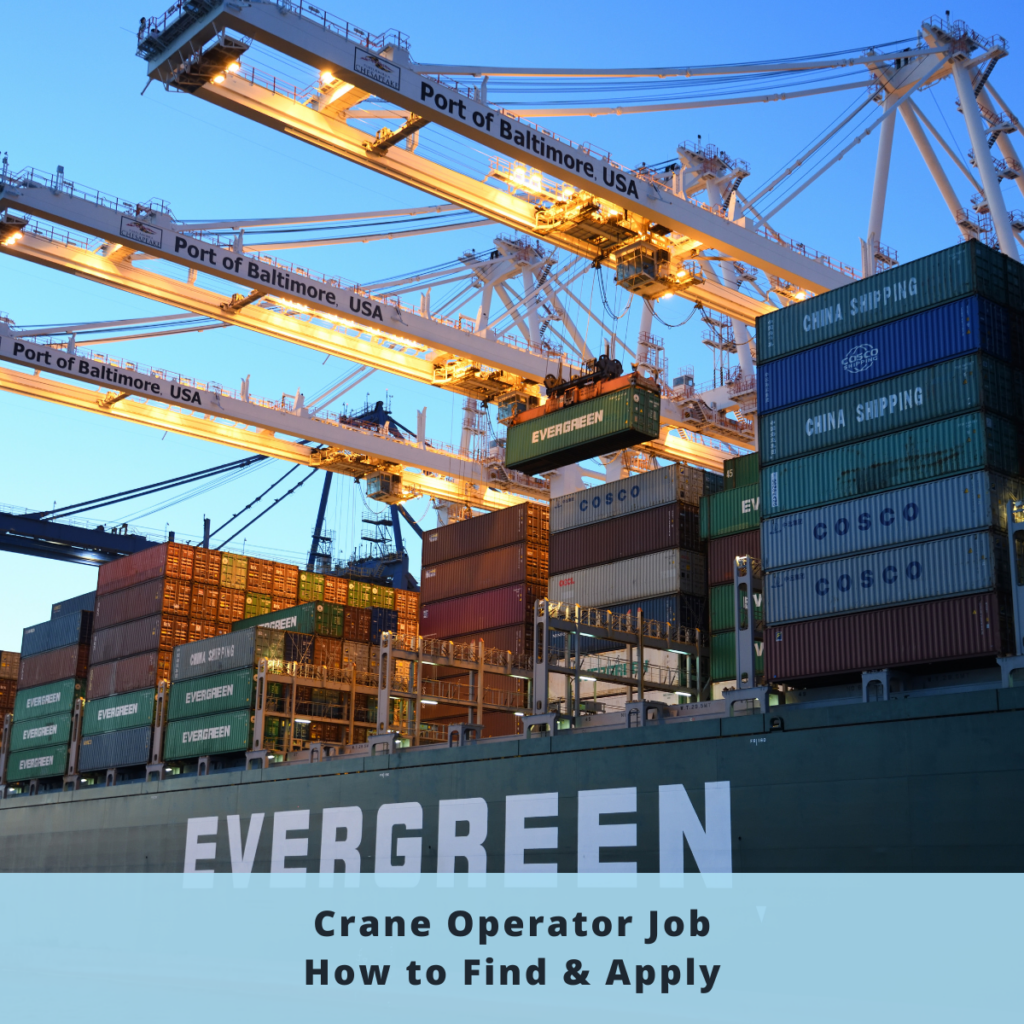Crane Operator Job in the Maritime Industry: How to Find One and Apply
If you're interested in working in the maritime industry and have experience operating cranes, then you may want to consider pursuing a career as a crane operator. Crane operators are responsible for operating cranes to move heavy equipment, cargo, and other materials on ships and offshore drilling platforms. In this article, we'll discuss how to find a crane operator job in the maritime industry, as well as the qualifications and requirements for the position.
What is a Crane Operator Job?
A crane operator job is a critical role in the maritime industry, where cranes are used to move heavy equipment, cargo, and other materials on ships, offshore drilling platforms, and other maritime vessels. Crane operators are responsible for the safe and efficient operation of cranes, which involves using controls to lift, move, and position heavy loads.
In the maritime industry, crane operators play a vital role in ensuring that materials and equipment are moved safely and efficiently. They work in a variety of environments, including loading and unloading cargo from ships, positioning equipment on offshore drilling platforms, and performing maintenance and repair work on cranes and other equipment.
Crane operators must be skilled in operating various types of cranes, including mobile cranes, tower cranes, and gantry cranes. They must also have a strong understanding of the principles of physics, such as leverage and torque, to ensure that loads are lifted and moved safely and efficiently.
One of the primary responsibilities of a crane operator is to follow safety protocols and regulations to prevent accidents and ensure the safe operation of the crane. This includes inspecting the crane and its components before each use, monitoring the surrounding environment for potential hazards, and communicating with other workers on the ship or offshore platform to ensure that materials and equipment are moved safely.

Crane operators must also be able to read and interpret blueprints, which provide detailed information about the materials and equipment that need to be moved. They must be able to plan their movements and adjust their approach based on the load's weight and size, as well as the location and position of other materials and equipment on the ship or offshore platform.
In addition to operating cranes, crane operators may also be responsible for performing maintenance and repair work on the cranes and other equipment. This involves inspecting and maintaining the crane's components, as well as repairing or replacing parts as needed to ensure that the crane operates safely and efficiently.
To become a crane operator in the maritime industry, individuals must complete an accredited crane operator training program and obtain certification from the National Commission for the Certification of Crane Operators (NCCCO). They must also have a high school diploma or GED equivalent and be physically fit to work in a variety of weather conditions.
Overall, a crane operator job in the maritime industry is a challenging and rewarding career that requires skill, experience, and a strong commitment to safety. Crane operators play a critical role in ensuring that materials and equipment are moved safely and efficiently, making them an essential part of the maritime industry's success.
Qualifications and Requirements for a Crane Operator Job
A crane operator job in the maritime industry is a highly specialized and demanding role that requires specific qualifications and requirements. Here are some of the most important qualifications and requirements for individuals interested in pursuing a career as a crane operator in the maritime industry:
Education and Training: To become a crane operator in the maritime industry, you need to have a high school diploma or equivalent. However, to operate cranes professionally, you will need specialized training from an accredited crane operator training program. These programs will provide you with the necessary knowledge and skills to operate a variety of cranes safely and efficiently.
Certification: The National Commission for the Certification of Crane Operators (NCCCO) provides certification for crane operators in the United States. Certification is not legally required, but it is highly recommended, as it demonstrates your knowledge and skills in crane operation and helps to enhance your career prospects.
Physical Fitness: Crane operators need to be physically fit, as the job requires them to stand for long periods and operate controls that require physical strength and dexterity. You will also need to have good hand-eye coordination and depth perception, as well as the ability to work in confined spaces.
Experience: Experience is not always required, but it can be a significant advantage when applying for a crane operator job. Many employers prefer candidates with some previous experience working with heavy equipment, as this demonstrates their ability to operate complex machinery safely and effectively.
Safety Awareness: Crane operators need to be safety-conscious and aware of the risks associated with operating heavy equipment. They must be able to follow safety protocols and regulations to prevent accidents and ensure the safe operation of the crane.
Communication Skills: Crane operators need to have strong communication skills, as they must be able to communicate effectively with other workers on the ship or offshore platform to ensure that materials and equipment are moved safely.
Availability: Crane operators in the maritime industry must be available to work long hours, including nights, weekends, and holidays. They may also need to work in remote locations and in adverse weather conditions.
How to Find a Crane Operator Job in the Maritime Industry
If you are interested in pursuing a career as a crane operator in the maritime industry, there are several ways to find job opportunities. Here are some tips on how to find a crane operator job in the maritime industry:
Check Job Listings: One of the easiest ways to find a crane operator job in the maritime industry is to check online job listings on job search websites such as, Vesseljoin, Indeed, Glassdoor, and LinkedIn. These websites often have a variety of job openings in the maritime industry, including crane operator positions.
Contact Employment Agencies: There are several employment agencies that specialize in placing candidates in jobs in the maritime industry. These agencies work with a variety of employers and can help you find job opportunities that match your skills and experience.
Attend Job Fairs: Maritime industry job fairs are excellent opportunities to network with employers and learn about job openings in the industry. Many job fairs are held in major ports and cities throughout the year, and attending these events can help you meet potential employers and learn about available job opportunities.
Research Companies: Researching companies that operate in the maritime industry can help you identify potential job opportunities. Many companies have career pages on their websites where they post job openings, and you can also contact their human resources departments directly to inquire about available positions.
Network: Networking is an essential part of finding a job in any industry, and the maritime industry is no exception. Reach out to friends, family, and colleagues who work in the industry and ask for advice and referrals. You can also join industry associations and attend industry events to expand your network and meet potential employers.
Be Persistent: Finding a job in the maritime industry can be challenging, so it is essential to be persistent in your job search. Keep applying for job openings, follow up with potential employers, and continue networking to increase your chances of finding a job.
In summary, there are several ways to find a crane operator job in the maritime industry, including checking job listings, contacting employment agencies, attending job fairs, researching companies, networking, and being persistent in your job search. By using these strategies, you can increase your chances of finding a rewarding career as a crane operator in the maritime industry.
How to Apply for a Crane Operator Job
Once you have identified a crane operator job in the maritime industry that you would like to apply for, there are several steps you can take to increase your chances of landing the job. Here are some tips on how to apply for a crane operator job in the maritime industry:
Review the Job Description: Before you apply for a crane operator job, make sure to review the job description carefully. This will help you understand the specific qualifications and requirements that the employer is looking for and ensure that your skills and experience are a good match.
Prepare Your Resume: Your resume is your chance to showcase your skills and experience as a crane operator. Make sure your resume highlights your relevant qualifications, including your education, training, certification, and work experience. Customize your resume to the specific job you are applying for and ensure that it is well-organized, easy to read, and error-free.
Write a Cover Letter: A well-crafted cover letter can help you stand out from other applicants and demonstrate your interest in the position. In your cover letter, introduce yourself and explain why you are interested in the crane operator job. Highlight your relevant skills and experience and explain how they make you a good fit for the position.
Submit Your Application: Once you have prepared your resume and cover letter, you can submit your application. Many employers prefer online applications, so make sure to follow the instructions on the job listing carefully. You may also need to submit additional documents, such as copies of your certifications or references.
Follow Up: After you have submitted your application, it is a good idea to follow up with the employer to express your interest in the position and inquire about the status of your application. You can do this by sending an email or making a phone call to the employer's human resources department.
Prepare for the Interview: If your application is successful, you will likely be invited for an interview. Make sure to prepare for the interview by researching the company and practicing your interview skills. Be prepared to answer questions about your experience as a crane operator, your knowledge of safety protocols and regulations, and your availability to work long hours.
In summary, to apply for a crane operator job in the maritime industry, you should review the job description, prepare your resume and cover letter, submit your application, follow up with the employer, and prepare for the interview. By taking these steps, you can increase your chances of landing the job and starting a rewarding career as a crane operator in the maritime industry.
Tips on Maximizing Salary
As a crane operator working in the maritime industry, it is important to maximize your salary and benefits to ensure financial stability and job satisfaction. Here are some tips on how to maximize your salary as a crane operator in the maritime industry:
Gain Experience: One of the best ways to maximize your salary as a crane operator is to gain experience in the field. The more experience you have, the more valuable you will be to your employer, which can lead to higher pay and better benefits. Consider taking on new challenges and responsibilities, and seek out opportunities for professional development and training.
Get Certified: In addition to experience, having the right certifications can also help you maximize your salary as a crane operator. Make sure to obtain all the necessary certifications required by your employer and industry regulations. Having additional certifications such as rigging or safety training can also increase your earning potential.
Negotiate Your Salary: When starting a new job or negotiating a salary increase, it is important to know your worth as a crane operator. Research the average salary for your position and experience level in the maritime industry, and be prepared to negotiate for a fair salary and benefits package.
Seek Out Higher-Paying Employers: Not all employers offer the same salary and benefits packages for crane operators. Consider seeking out higher-paying employers, such as larger shipping companies or ports, or those with a strong reputation for fair compensation.
Be Willing to Travel: As a crane operator, you may have the opportunity to work on projects in different locations around the world. Being willing to travel can help you access higher-paying jobs and gain valuable experience working in different environments.
Consider Union Membership: Joining a union can provide you with additional bargaining power when negotiating your salary and benefits. Consider joining a union that represents crane operators in the maritime industry.






